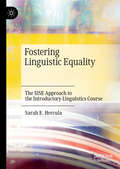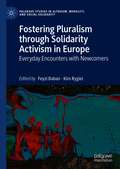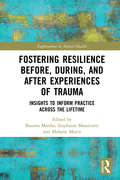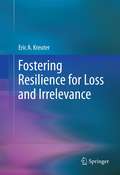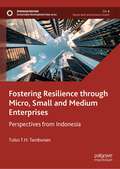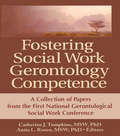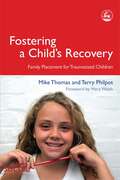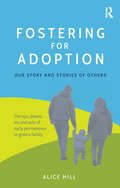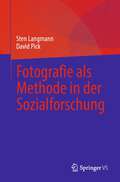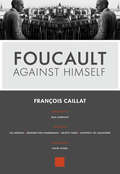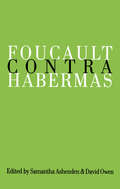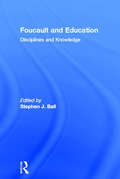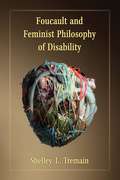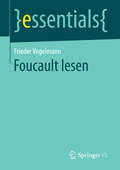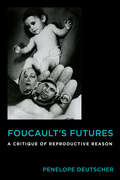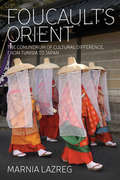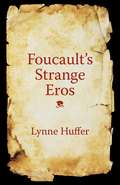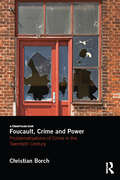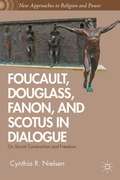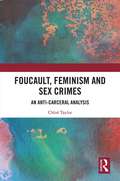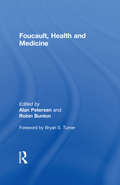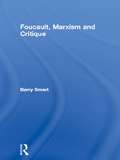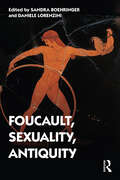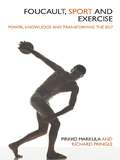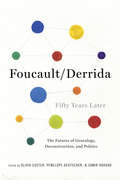- Table View
- List View
Fostering Linguistic Equality: The SISE Approach to the Introductory Linguistics Course
by Sarah E. HerculaThis book offers one possible solution in the pursuit of linguistic equality by exploring how the Structural Inquiry of Stigmatized English (SISE) approach to linguistics pedagogy can be used to empower linguistics students and researchers as ambassadors for change. By using stigmatized varieties of English (including African American English, Chicano English, and Appalachian English) as the primary linguistic data analyzed through detailed structural analysis, the SISE approach fosters linguistically principled and pluralistic language attitudes among students, as evidenced by the author’s own empirical research in applying the method. This book not only advocates for linguistic equality but also provides teachers and researchers with the tools they need to counteract prejudicial attitudes and disinformation about language both in and outside the classroom. It will be an essential resource for linguistics teachers, applied linguists, curriculum developers, students and scholars of language attitudes and language variation, and anyone seeking more information about the relationships between diversity, (in)equality, and language.
Fostering Pluralism through Solidarity Activism in Europe: Everyday Encounters with Newcomers (Palgrave Studies in Altruism, Morality, and Social Solidarity)
by Feyzi Baban Kim RygielThis edited collection brings together academics, artists and members of civil society organizations to engage in a discussion about the ideas of living with others, through concepts such as cosmopolitanism, solidarity, and conviviality, and the practices of doing so. In recent years, right wing and populist movements have emerged and strengthened across Europe and North America, rejecting the value of cultural, ethnic and religious plurality. Governments in Europe and North America are weakening their commitment to the international refugee regime, erecting new barriers to entry. Even as governments fail to accommodate growing pluralism, however, civil society initiatives have emerged with the aim of welcoming newcomers, such as migrants and refugees, and finding alternative ways of living together in diverse societies. Motivated by a desire to show solidarity, these initiatives demonstrate enormous creativity in fostering pluralism in an environment that has largely become hostile to the arrival of newcomers. The contributions gathered here seek to explore such initiatives and the important work that they do in fostering ways of living together with others from diverse cultural and religious backgrounds. In focusing conceptually and empirically on discussions and examples of civil society initiatives, this book interrogates why, how and under what circumstances are some communities more welcoming than others.
Fostering Resilience Before, During, and After Experiences of Trauma: Insights to Inform Practice Across the Lifetime (Explorations in Mental Health)
by Buuma MaishaThis edited volume recognizes that resilience, and the most effective means of harnessing it, differ across individuals, contexts and time. Presenting chapters written by a range of scholars and clinicians, the book highlights effective evidence-based approaches to nurturing resilience, before, during and after a traumatic experience or event. By identifying distinct therapeutic tools which can be used effectively to meet the particular needs and limitations associated with different age groups, clients and types of experience, the volume addresses specific challenges and benefits of nurturing resilience and informs best practice as well as self-care. Approaches explored in the volume include the use of group activities to teach resilience to children, the role of sense-making for victims of sex trafficking, and the ways in which identity and spirituality can be used to help young and older adults in the face of pain and bereavement. Chapters also draw on the lived experiences of those who have engaged in a personal or guided journey towards finding new meaning and achieving posttraumatic growth following experiences of trauma. The rich variety of approaches offered here will be of interest to clinicians, counsellors, scholars and researchers involved in the practice and study of building resilience, as well as trauma studies, psychology and mental health more broadly. The personal and practice-based real-life stories in this volume will also resonate with individuals, family and community members facing adversity.
Fostering Resilience for Loss and Irrelevance
by Eric A. KreuterThe compensating construct of resiliency, itself, has not been compared to the problem of loss of relevancy. Therefore, there is an open corridor for the enlightened therapist, career coach, or mentor to appropriately guide a troubled person with targeted challenges to transform themselves into a newly thriving being. This book explores the topic in detail with references to the literature where prior theory can be applied to advance this topic further. Anecdotal evidence supporting the authors' perspective is presented, including several brief case studies of individuals who have thrived following cessation of their prior careers.
Fostering Resilience through Micro, Small and Medium Enterprises: Perspectives from Indonesia (Sustainable Development Goals Series)
by Tulus T.H. TambunanThis book focuses on the development of Micro, Small and Medium Enterprises (MSMEs) in Indonesia based on various primary and secondary field surveys. In doing so, the book provides a regional comparison of countries in Asia- Pacific, covering issues such as employment generation, formation of gross domestic product (GDP), export development, development constraints, productivity, and investment. To achieve this, the book analyzes the role of partnerships between MSMEs such as large companies, banks and government institutions, and the role of cooperatives. It also includes studies on women’s entrepreneurship in Indonesia, and also explores the crisis mitigating measures (CMMs) widely adopted by MSMEs affected by financial crises in the past. Finally, the book also examines the development of financial technology (FinTech), and in particular peer-to-peer (P2P) lending and how this can serve as an alternative source of funding for MSMEs in Indonesia. Aspects of this book would be useful to students, researchers, practitioners, and also those interested in economic-related sustainable development goals (SDGs), given the importance the United Nations (UN) has assigned to MSMEs for taking a lead in employment creation, and poverty eradication.
Fostering Social Work Gerontology Competence: A Collection of Papers from the First National Gerontological Social Work Conference
by Catherine J. Tompkins Anita L. RosenInspire the next generation of gerontological social workersThe growing number of people over the age of 65 in the United States has increased the demand for social workers who are trained to work with the elderly—a demand that’s in danger of not being met. Fostering Social Work Gerontology Competence presents innovative techniques and strategies to help educators infuse aging content into their graduate and undergraduate curriculums in an effort to produce a new generation of social work practitioners who are up to the task of working with an older population. Recent surveys show that there has been a decline in the number of aging specialties and courses offered by schools of social work. Fostering Social Work Gerontology Competence offers a renewed focus on the promotion of gerontological social work education, presenting papers that grew out of the first National Gerontological Social Work Conference (NGSWC), held in 2003. This unique book is invaluable to anyone who educates future social workers, leads staff training sessions, and/or teaches continuing education courses on aging. Leading gerontologists examine teaching research, community collaboration, and social work competencies, while focusing on special populations and issues including end-of-life care, elder abuse, grief counseling, cultural diversity, cultural competence, and the effects of spirituality and social support on the well being of the elderly.Fostering Social Work Gerontology Competence examines: curricular and organizational change developing intergenerational projects involving older persons in the educational process uniting field practice with theory strategies to promote student interest identifying geriatric competencies intergenerational service learning developing an aging prepared community emerging trends in aging and health care end-of-life care and death education environmental issues affecting elder abuse victims mental health services for older persons in rural communities kinship care and much moreFostering Social Work Gerontology Competence is a vital resource for social work educators and practitioners, gerontology educators and practitioners, and students.
Fostering a Child's Recovery: Family Placement for Traumatized Children
by Mike Thomas Terry Philpot Mary WalshThe overwhelming majority of children and young people in care today are fostered, but for some this only increases their problems through untreated trauma, ill-judged placements, poorly supported foster carers and multiple moves. This practical and evidence-based book outlines the principles of family placement on the basis of planning and evidence, and explores the qualities, skills and insights that create positive placement outcomes. Fostering a Child's Recovery shows how the key to good fostering is well-trained and skilled foster carers who form part of a team of professionals who surround the child. This book will benefit all professionals and parents involved in providing recovery for traumatized children and young people in ensuring successful placements.
Fostering for Adoption: Our story and stories of others
by Alice HillFor anyone considering or going through Fostering for Adoption, this book gives you a detailed, personal account of the process which takes you through all the stages and prepares you to cope with the highs and lows. Fostering for Adoption is a relatively recent initiative (Children and Families Act, 2014) in the adoption legal landscape, seeking early permanence for babies and young children where adoption is most likely to be the plan for the child. This is often cited as a route to be in the best interests of the child, enabling secure attachments and stability. However, for adopters it is inherently risky, it is the adopters who take on the risk in this situation, accept the placement on a fostering basis and hope that the final outcome will be adoption. There is currently a knowledge gap on experiences of Fostering for Adoption which this book tackles. Written from an adopters’ perspective of the risks and challenges, as well as the benefits that it brings, it is perfect for those who are considering the process as well as their friends and family. A book on Fostering for Adoption can’t just focus on one story and one outcome so we’ve included case studies which cover the key experiences adopters may face when agreeing to accept a baby on a Foster to Adopt placement such as: Caring for a baby a few days after birth The paperwork, rules and fostering process The uncertainty and risk Meeting with birth parents Contact Looking after a withdrawing baby A termination of placement Written in an engaging and friendly style, this book is perfect reading for anyone looking to adopt a child and for adoption professionals seeking to understand the experience of the adopter more profoundly.Praise for Fostering for AdoptionAs someone who has been through a similar journey this book resonated with me. It is honest about the ups and downs and is a great, informative book for anybody thinking of taking this route or who have family or friends that are. I can say that this book will help anyone at the beginning of their journey, to help them through the process and – start the lifetime of learning about how we can support our children.Lisa Faulkner, Author, Meant to be.Alice’s book will be a great companion to anyone considering or starting on the foster to adopt process. It is well-researched and written and doesn’t shy away from the many complexities and the considerations that adults must make in the best interests of children.Sally Donovan, Author of No Matter What, and Editor of Adoption Today.I thoroughly enjoyed reading this book, I found myself laughing and getting emotional throughout. As someone who has themselves been adopted, but who is also a social worker who has now adopted a child, this book is brilliant from every angle. A must read for anyone considering Fostering for Adoption.Jo, Social Worker, Midlands.“This book gives a balanced and honest view of the whole Fostering for Adoption journey. It gets to the emotions and seriousness of decisions being made about children's lives. This is an important read for any potential adopter and will be on our book lists for sure.”Angi, Social Worker, Adoption Tees Valley.
Fotografie als Methode in der Sozialforschung
by Sten Langmann David PickDieses Buch konzentriert sich auf die Fotografie im Bereich der Sozialforschung. Es schafft eine umfassende Grundlage für die Fotografie als Methode der Sozialforschung und beschreibt verschiedene Techniken und Anwendungen der Fotoforschung. Das Buch bietet zudem reichhaltige Ansätze für die Forschungsfotografie, von der Vorbereitung und den ethischen Erwägungen, die vor dem Einsatz im Feld verstanden werden müssen, bis hin zur Datenerfassung, Analyse und Aufbereitung für die Veröffentlichung. Darüber hinaus werden künstlerische Gattungen der Fotografie vorgestellt, um den Lesern bei der Auswahl ihrer fotografischen Forschungsarbeit zu helfen und sie daran zu erinnern, dass sie beim Sammeln von Fotografien tatsächlich Kunst produzieren. Die ethischen Fragen bieten zudem neue Schwerpunkte für Leser zur Würde der Teilnehmer und weiter Überlegungen zur Anonymität oder auch Anerkennung, informierter Zustimmung, Forschung mit bedürftigen Gruppen, ungleichen Machtverhältnissen, und möglichen Interventionen. In einer Kombination aus Vorbereitung und Ethik wird hinterfragt, wie man am besten gute Fotos sammeln und aufnehmen kann, und es werden die praktischen Fragen der Stigmatisierung erörtert und Verständnis zur Unterstützung der Forscher im Feld eingeführt. Anschließend werden die verschiedenen fotoanalytischen Ansätze für Forscher erörtert und Beispiele für die Analyse von Fotos mit den verschiedenen Techniken gegeben. Abschließend bietet das Buch Leitlinien mit Beispielen für Forscher, die ihre Arbeit veröffentlichen möchten und wie dies ermöglicht werden kann.
Foucault Against Himself
by Arlette Farge Georges Didi-Huberman Leo Bersani François Caillat Geoffroy De LagasnerieIn his private life, as well as in his work and political attitudes, Michel Foucault often stood in contradiction to himself, especially when his expansive ideas collided with the institutions in which he worked.<P><P> In Francois Caillat's provocative collection of essays and interviews based on his French documentary of the same name, leading contemporary critics and philosophers reframe Foucault's legacy in an effort to build new ways of thinking about his struggle against society's mechanisms of domination, demonstrating how conflict within the self lies at the heart of Foucault's life and work.Includes a foreword written especially for this edition by Paul Rabinow, Professor of Anthropology at the University of California (Berkeley) and an influential writer on the works of Foucault; he is the co-editor of The Essential Foucault.Foucault against Himself features essays and interviews by:Leo Bersani, American Professor Emeritus of French at the University of California (Berkeley) and the author of Homos;Georges Didi-Huberman, French philosopher and art historian; his most recent book is Gerhard Richter: Pictures/SeriesArlette Farge, French historian and the author of The Allure of the Archives;Geoffroy de Lagasnerie, French philosopher and the author of La derniere lecon de Michel Foucault.
Foucault Contra Habermas: Recasting the Dialogue between Genealogy and Critical Theory (Social Theory Ser.)
by David Owen Samantha AshendenFoucault contra Habermas is an incisive examination of, and a comprehensive introduction to, the debate between Foucault and Habermas over the meaning of enlightenment and modernity. It reprises the key issues in the argument between critical theory and genealogy and is organised around three complementary themes: defining the context of the debate; examining the theoretical and conceptual tools used; and discussing the implications for politics and criticism. In a detailed reply to Habermas' Philosophical Discourse of Modernity, this volume explains the difference between Habermas' philosophical practice and Foucault's between the analytics of truth and the politics of truth. Many of the most difficult arguments in the exchange are subject to a detailed critical analysis. This examination also includes discussion of the ethics of dialogue; the practice of criticism; the politics of recognition , and the function of civil society and democracy.
Foucault and Education: Disciplines and Knowledge (Routledge Library Editions: Michel Foucault)
by Stephen J. BallFirst published in 1990, this book was the first to explore Foucault's work in relation to education, arguing that schools, like prisons and asylums, are institutions of moral and social regulation, complex technologies of disciplinary control where power and knowledge are crucial. Original and challenging, the essays assess the relevance of Foucault's work to educational practice, and show how the application of Foucauldian analysis to education enables us to see the politics of educational reform in a new light.
Foucault and Feminist Philosophy of Disability
by Shelley Lynn TremainFoucault and Feminist Philosophy of Disability is a distinctive contribution to growing discussions about how power operates within the academic field of philosophy. By combining the work of Michel Foucault, the insights of philosophy of disability and feminist philosophy, and data derived from empirical research, Shelley L. Tremain compellingly argues that the conception of disability that currently predominates in the discipline of philosophy, according to which disability is a natural disadvantage or personal misfortune, is inextricably intertwined with the underrepresentation of disabled philosophers in the profession of philosophy. Against the understanding of disability that prevails in subfields of philosophy such as bioethics, cognitive science, ethics, and political philosophy, Tremain elaborates a new conception of disability as a historically specifi c and culturally relative apparatus of power. Although the book zeros in on the demographics of and biases embedded in academic philosophy, it will be invaluable to everyone who is concerned about the social, economic, institutional, and political subordination of disabled people.
Foucault lesen (essentials)
by Frieder VogelmannDieses essential stellt einen systematischen und philosophischen Lekturevorschlag zur Diskussion: Systematisch werden Foucaults Schriften von seiner methodologischen Perspektive her als nihilistische, nominalistische und historizistische Analyse von Praktiken und den in ihnen produzierten Wirklichkeiten entlang der drei Achsen des Wissens, der Macht und der Selbstverhaltnisse gedeutet. Die Konsequenzen dieser Interpretation werden anhand der Positionen umrissen, die sich in Bezug auf Foucaults Kritikbegriff, seine Attacke auf die Human- und, als Teil davon, die Sozialwissenschaften und sein Verhaltnis zum Neoliberalismus ergeben. Philosophisch ist dieser Lekturevorschlag, weil er die Historisierung von Wahrheit als Kern von Foucaults philosophischem Verfahren behauptet. "
Foucault's Futures: A Critique of Reproductive Reason (Critical Life Studies)
by Penelope DeutscherIn Foucault's Futures, Penelope Deutscher reconsiders the role of procreation in Foucault's thought, especially its proximity to risk, mortality, and death. She brings together his work on sexuality and biopolitics to challenge our understanding of the politicization of reproduction. By analyzing Foucault's contribution to the politics of maternity and its influence on the work of thinkers such as Roberto Esposito, Giorgio Agamben, and Judith Butler, Deutscher provides new insights into the conflicted political status of reproductive conduct and what it means for feminism and critical theory.
Foucault's Orient: The Conundrum of Cultural Difference, From Tunisia to Japan
by Marnia LazregFoucault lived in Tunisia for two years and travelled to Japan and Iran more than once. Yet throughout his critical scholarship, he insisted that the cultures of the "Orient" constitute the "limit" of Western rationality. Using archival research supplemented by interviews with key scholars in Tunisia, Japan and France, this book examines the philosophical sources, evolution as well as contradictions of Foucault's experience with non-Western cultures. Beyond tracing Foucault's journey into the world of otherness, the book reveals the personal, political as well as methodological effects of a radical conception of cultural difference that extolled the local over the cosmopolitan.
Foucault's Strange Eros
by Lynne HufferWhat is the strange eros that haunts Foucault’s writing? In this deeply original consideration of Foucault’s erotic ethics, Lynne Huffer provocatively rewrites Foucault as a Sapphic poet. She uncovers eros as a mode of thought that erodes the interiority of the thinking subject. Focusing on the ethical implications of this mode of thought, Huffer shows how Foucault’s poetic archival method offers a way to counter the disciplining of speech.At the heart of this method is a conception of the archive as Sapphic: the past’s remains are, like Sappho’s verses, hole-ridden, scattered, and dissolved by time. Listening for eros across fragmented texts, Huffer stages a series of encounters within an archive of literary and theoretical readings: the eroticization of violence in works by Freud and Eve Kosofsky Sedgwick, the historicity of madness in the Foucault-Derrida debate, the afterlives of Foucault’s antiprison activism, and Monique Wittig’s Sapphic materialism. Through these encounters, Foucault’s Strange Eros conceives of ethics as experiments in living that work poetically to make the present strange. Crafting fragments that dissolve into Sapphic brackets, Huffer performs the ethics she describes in her own practice of experimental writing. Foucault’s Strange Eros hints at the self-hollowing speech of an eros that opens a space for the strange.
Foucault, Crime and Power: Problematisations of Crime in the Twentieth Century
by Christian BorchThis book presents a Foucauldian problematisation analysis of crime, with a particular focus on the twentieth century. It considers how crime has been conceived as problem and, by scrutinising the responses that have been adapted to deal with crime, demonstrates how a range of power modalities have evolved throughout the twentieth century. Christian Borch shows how the tendency of criminologists to focus on either disciplinary power or governmentality has neglected the broader complex of Foucault’s concerns: ignoring its historical underpinnings, whilst for the most part limiting studies to only very recent developments, without giving sufficient attention to their historical backdrop. The book uses developments in Denmark – developments that can be readily identified in most other western countries – as a paradigmatic case for understanding how crime has been problematised in the West. Thus, Foucault, Crime and Power: Problematisations of Crime in the Twentieth Century demonstrates that a Foucauldian approach to crime holds greater analytical potentials for criminological research than have so far been recognized.
Foucault, Douglass, Fanon, and Scotus in Dialogue
by Cynthia R. NielsenThrough examining Douglass's and Fanon's concrete experiences of oppression, Cynthia R. Nielsen demonstrates the empirical validity of Foucault's theoretical analyses concerning power, resistance, and subject-formation. Going beyond merely confirming Foucault's insights, Douglass and Fanon expand, strengthen, and offer correctives to the emancipatory dimensions of Foucault's project. Unlike Foucault, Douglass and Fanon were not hesitant to make transhistorical judgments condemning slavery and colonization. Foucault's reticence here signals a weakness in his account of human being. This weakness sets him at cross-purposes not only with Scotus, but also with Douglass and Fanon. Scotus's anthropology provides a basis for transhistorical moral critique; thus he is a valuable dialogue partner for those concerned about social justice and human flourishing.
Foucault, Feminism, and Sex Crimes: An Anti-Carceral Analysis
by Chloë TaylorThis book brings together Foucault's writings on crime and delinquency, on the one hand, and sexuality, on the other, to argue for an anti-carceral feminist Foucauldian approach to sex crimes. The author expands on Foucault’s writings through intersectional explorations of the critical race, decolonial, critical disability, queer and critical trans studies literatures on the prison that have emerged since the publication of Discipline and Punish and The History of Sexuality. Drawing on Foucault’s insights from his genealogical period, the book argues that those labeled as sex offenders will today be constructed to re-offend twice over, once in virtue of the delinquency with which they are inculcated through criminological discourses and in the criminal punishment system, and second in virtue of the manners in which their sexual offense is taken up as an identity through psychological and sexological discourses. The book includes a discussion of non-retributive responses to crime, including preventative, redistributive, restorative, and transformative justice. It concludes with two appendixes: the original 19th-century medico-legal report on Charles Jouy and its English translation by the author. Foucault, Feminism, and Sex Crimes will be of interest to feminist philosophers, Continental philosophers, Women’s and Gender Studies scholars, social and political theorists, as well as social scientists and social justice activists.
Foucault, Health and Medicine
by Alan Petersen Robin BuntonThe reception of Michel Foucault's work in the social sciences and humanities has been phenomenal. Foucault's concepts and methodology have encouraged new approaches to old problems and opened up new lines of enquiry. This book assesses the contribution of Foucault's work to research and thinking in the area of health and medicine, and shows how key researchers in the sociology of health and illness are currently engaging with his ideas. Foucault, Health and Medicine explores such important issues as: Foucault's concept of 'discourse', the critique of the 'medicalization' thesis, the analysis of the body and the self, Foucault's concept of 'bio-power' in the analysis of health education, the implications of Foucault's ideas for feminist research on embodiment and gendered subjectivities, the application of Foucault's notion of governmentality to the analysis of health policy, health promotion, and the consumption of health. Foucault, Health and Medicine offers a `state of the art' overview of Foucaldian scholarship in the area of health and medicine. It will provide a key reference for both students and researchers working in the areas of medical sociology, health policy, health promotion and feminist studies.
Foucault, Marxism and Critique (Routledge Library Editions: Michel Foucault)
by Barry SmartIn this work, originally released in 1983, Barry Smart examines the relevance of Foucault's work for developing an understanding of those issues which lie beyond the limits of Marxist theory and analysis - issues such as 'individualising' forms of power, power-knowledge relations, the rise of 'the social', and the associated socialisation of politics. He argues that there exist clear and substantial differences between Foucault's genealogical analysis and that of Marxist theory. Smart thus presents Foucault's work as a new form of critical theory, whose object is a critical analysis of rationalities, and of how relations of power are rationalised.
Foucault, Sexuality, Antiquity
by Sandra BoehringerFoucault, Sexuality, Antiquity, published for the first time in English, takes an interdisciplinary approach to exploring how the work of Michel Foucault has influenced studies of ancient Greece and Rome. Foucault’s The History of Sexuality has had a profound and lasting impact across the humanities and social sciences. In the two volumes dedicated to pagan antiquity, Foucault provided scholars with new questions for addressing ancient Greek and Roman societies, and an original epistemological framework for thinking about eroticism and about the processes by which individuals are led to recognize themselves as the subjects of their desires. Now, decades later, the scholars in this volume explore Foucault’s role in shaping and reorienting discussions of antiquity in the fields of philosophy, gender studies, and psychoanalysis, among others. A multidisciplinary exploration of Foucault’s work and its relationship to our understanding of ancient Greco-Roman societies, Foucault, Sexuality, Antiquity will be of interest to students and scholars in classical studies, philosophy, gender studies, and ancient history.
Foucault, Sport and Exercise: Power, Knowledge and Transforming the Self
by Richard Pringle Pirkko Markula-DenisonMichel Foucault’s work profoundly influences the way we think about society, in particular how we understand social power, the self, and the body. This book gives an innovative and entirely new analysis of is later works making it a one-stop guide for students, exploring how Foucauldian theory can inform our understanding of the body, domination, identity and freedom as experienced through sport and exercise. Divided into three themed parts, this book considers: Foucault’s ideas and key debates Foucault’s theories to explore power relations, the body, identity and the construction of social practices in sport and exercise how individuals make sense of the social forces surrounding them, considering physical activity, fitness and sport practices as expressions of freedom and sites for social change. Accessible and clear, including useful case studies helping to bring the theory to real-life, Foucault, Sport and Exercise considers cultures and experiences in sports, exercise and fitness, coaching and health promotion. In addition to presenting established Foucauldian perspectives and debates, this text also provides innovative discussion of how Foucault’s later work can inform the study and understanding of sport and the physically active body.
Foucault/Derrida Fifty Years Later: The Futures of Genealogy, Deconstruction, and Politics (New Directions in Critical Theory #12)
by Penelope Custer Olivia Deutscher Haddad SamirEarly in their careers, Michel Foucault and Jacques Derrida argued over madness, reason, and history in an exchange that profoundly influenced continental philosophy and critical theory. In this collection, Amy Allen, Geoffrey Bennington, Lynne Huffer, Colin Koopman, Pierre Macherey, Michael Naas, and Judith Revel, among others, trace this exchange in debates over the possibilities of genealogy and deconstruction, immanent and transcendent approaches to philosophy, and the practical and theoretical role of the archive.
